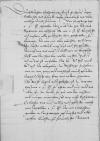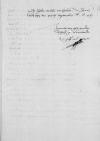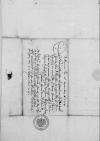List #5267
Ioannes DANTISCUS do Albrecht I von Hohenzollern-AnsbachHeilsberg (Lidzbark Warmiński), 1541-09-23
| odebrano 1541-09-25 Rękopiśmienne podstawy źródłowe:
Pomocnicze podstawy źródłowe:
Publikacje:
| ||||||||||
Tekst + aparat krytyczny + komentarzZwykły tekstTekst + komentarzTekst + aparat krytyczny
 GStA PK, HBA, C1 No 793, 3 unnumbered
GStA PK, HBA, C1 No 793, 3 unnumbered
Dem durchlauchten, hochgebornen fursten und herren, hern
 GStA PK, HBA, C1 No 793, 1 unnumbered
GStA PK, HBA, C1 No 793, 1 unnumbered
Durchlauchter, hochgeborner furst, hochgunstiger, lieber her und freundt. / Unser freuntliche und vleiswillige dinste zuvoran. /
Uns ist gestrigs tags E(wer) F(urstlichen) D(urchlauch)t cf.  GStA PK, HBA, C1 No 793, 2 unnumbered nicht haben wollen vorhalten. /
GStA PK, HBA, C1 No 793, 2 unnumbered nicht haben wollen vorhalten. /
Dat(um)
qui sup(ra) ma(n)u p(ro)pria s(ub)s(cripsi)t


